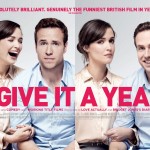“Be good to people and they’ll be good to you”
I Give It A Year is a likeable if embarrassing romcom closely related to Four Weddings And A Funeral and Love Actually, minus a good proportion of the charm and charisma that makes you remember them quite so fondly. Call them first cousins, once removed, with IGIAY cast maybe as with the soft-centredness so characteristic of the family, but maybe the slightly crude black sheep? Anyway, not a surprise to see it advertised as having the same producers as FWAAF, Notting Hill and many more of the same ilk.
It is decidedly British with a British, American and Aussie cast, plus the obligatory frightfully British middle class cringe-factor humour associated closely with films starring Hugh Grant (at one point in this movie a reverential nod is made with the line that a situation was “like a Hugh Grant movie“), but since writer-director Dan Mazer is most closely associated with co-writing the Sacha Baron Cohen films Borat and Brüno, you won’t be surprised to learn that for all the romcom soft centre this is a movie that tries to be edgy and just a tad shocking but doesn’t quite succeed – although an enjoyable time will be had by all.
So no Richard Curtis, and for Grant read gangly Stephen Merchant, best known buddy of Ricky Gervais and Karl Pilkington. Merchant is employed to do the embarrassing cameo, and boy does he go for it – the only surprise is that none of the women he talks to chooses to clock him one in response to his autistic-esque rants insulting them to the quick, minus self-awareness of any description. You can’t blame the actor but you can blame Mazer for making Merchant’s monologues almost unwatchable, the sort of movie making that not only makes you shudder but makes you want to punch holes in your TV, and the lawyer advising the happy couple on making a will comes pretty close in the cringing stakes.
Luckily, there are not too many Merchant monologues, though sadly they do include a Best Man’s speech at the wedding of Rose Byrne and Rafe Spall‘s Nat and Josh that call to mind very clearly the Best Man’s speech uttered by Tom (James Fleet) in Four Weddings. For that matter, the vicar with a coughing fit brought back visions of Rowan Atkinson‘s nervous and bumbling rector too.
The essence of this tale is very simple: couple falls in love and gets married but it rapidly becomes obvious that oafish writer Josh and icy Account Director Nat are not suited to one another. Through a series of unfortunate events, and encounters with his lovely ex Chloe (Anna Faris), who seems unfairly denigrated for her looks and alleged lack of sex appeal, and her amorously handsome American client, solvent and bleach magnate Guy Harrap (Simon Baker), and indeed their respective parents, reach crisis point at 9 months and tell their story in flashback during a meeting with anarchic marriage guidance counsellor Linda (a brilliant movie-stealing cameo from Olivia Colman.)
The ending might be twee and predictable, but along the way there are plenty of laughs from an inventive script (if you can put up with the Stephen Merchant bits) with plenty of quotable one-liners (which I would quote if I could remember them), plus some well-judged set-pieces – notably Chloe’s reluctant involvement in a threesome, the marriage counsellor ranting at her husband by mobile, and two doves chased by a violinist when Guy decides to declare his love for Nat.
Actually, I can remember a few. “Are you going to pay for that?” says the assistant in a sex shop through the changing curtain as Chloe models orange and pink underwear that reminded me of Fruit Salad sweets when I was a kid. “Christ, I expect so,” replies Josh. Sweet!
Oh, and especially the scene with the game of charades to embarrass Nat’s parents (how would you mime “Octopussy” anyway?) causes some of the nastiest silences you’ve ever heard. Likewise with the Christmas present of a digital photo frame, for which Rafe Spall’s stunt double penis is given an airing (yes, that is correct.) To a great degree there are many moments you can think back through years of marriage that could and quite possibly did happen, or maybe even stuff worse still that nobody would ever believe if it appeared in a mainstream movie.
S0, a slight tale, but that is not necessarily why the critics were sniffy. I suspect it may be they think the FWAAF/LA genre of British romantic comedies is now a very passé trend and that treating it as a cash cow is not kosher, though some point to plot holes (how did Josh and Nat both know independently that Guy and Chloe would be at St Pancras for the Eurostar?!) and generally unsympathetic and somewhat flimsy characters.
Well, I remember Spall in Shadow Line. I detested his character, but then since the character was highly detestable that was indicative of the quality of Spall’s acting. Here his character is a buffoon and he looks much less comfortable, but then I don’t believe Byrne, Baker or Faris feel totally in tune with their characters either. Minnie Driver (she of the uncomfortably close-set eyes) and Jason Flemyng as the bickering couple showing what marriage should not be like seem must more at home. I’m sure they must have practised rowing for months in preparation.
I also suspect they might also consider this a flippant view of marriage, a subject endlessly analysed but inherently the bedrock of society. Not entirely fair, since Mazer’s main purpose is to be funny, and on the whole he succeeds (and it’s a damn sight funnier than Anchorman, for example.) This might be a caricature of marriages, and not one without value or purpose.
Sure, the jokes come thick and fast, and a second viewing is required to catch up with them all, but this is not necessarily a movie you would watch repeatedly. Where my daughter watches Love Actually several times a year, I wonder whether she will feel the same about IGIAY? Quite possibly not.










